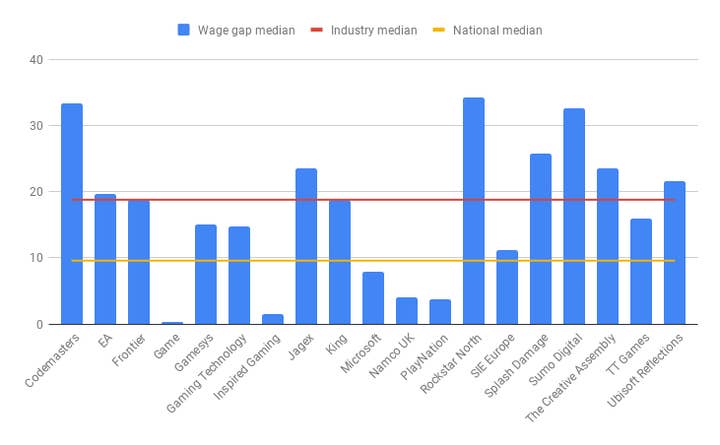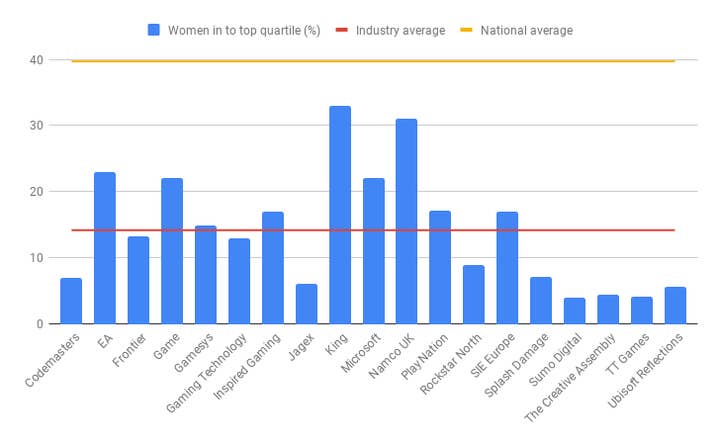Gender pay gap widens in UK games industry
Women increase their representation throughout gaming, but median wages losing ground
The UK industry gender pay gap widened last year by 3.5%, and continues to be well above national averages in terms of inequality.
According to the latest government figures, the median gender wage disparity is 18.8% compared to a national median wage gap of 9.6%.
Over 10,000 companies submitted their data. Of the 19 games-related companies GamesIndustry.biz identified , every single one paid women a lower median wage than men.
While the data is not detailed enough to provide an examination of equal pay for equal work, it does shine a light on inequality in the industry in areas such as median pay disparity, difference in bonus pay, and number of high-ranking female employees.
Additionally, given that only companies with more than 250 UK staff were legally required to submit data, there are several notable omissions including Activision, Ninja Theory, Nintendo UK, Sega, Team17, and Playground Games.
Some companies, such as Rockstar North, include data for subsidiaries while King is considered a separate entity from Activision and is reported by the government as Midasplayer.com.
The three companies with the largest gender wage gap remained the same as 2017, though the order has shifted around a little.
Rockstar North now has the largest median wage gap at 34.4%, followed closely by Codemasters with 33.3% and Sumo Digital with 32.6%.
While Rockstar and Codemasters' median wage gap grew by 2.5% and 5.4% respectively, Sumo Digital saw its gap shrink by just under 2%.
Meanwhile, GAME (0.3% ), Inspired Gaming (1.5%), PlayNation (3.8%) , and Namco (4%) and all had the narrowest gender wage gap, which was narrower than both industry and national averages.

In public statements addressing the wage gap, the running theme was that female employees were receiving equal pay for equal work, but the disparity comes from a lack of women working in the industry.
"It is widely acknowledged that encouraging women into the industry starts at a young age, as such, we are working in partnership with schools and colleges in the community to help educate, attract and inspire girls and young women into an education in STEM subjects," said Codemasters CEO Frank Sagnier.
"Concurrently, we have committed to a series of university lectures, games education summits and school career days all with the aim of promoting Codemasters and attracting the next generation of talent, regardless of gender."
It was a sentiment echoed by Sumo managing director Paul Porter who said: "While Sumo's gender pay gap results for 2018 are a slight improvement on the previous year, we recognize there is much more we need to do. We are investing in quantifiable, sustainable initiatives designed to have a positive impact on reducing the gap in the coming years."
Even so, gender diversity in the games industry did actually improve across all four pay quartiles -- though by the narrowest of margins.
It tilts overwhelmingly towards men, especially in the top quartile where on average just 14.2% of employees are women (up 0.3% year-on-year).
The games industry still lags behind other sectors overall, where the average for women employed in the top pay quartile 39.7%.
The best companies for women represented in the top quartile were King (33%), Namco (31%), Electronic Arts (23%), and GAME (22%).
Sumo Digital had the lowest percentage of women in the top quartile with just 4%, followed by TT Games (4.2%), The Creative Assembly (4.5%), Ubisoft Reflections (5.6%), Jagex (6.1%), and Codemasters (7%).

Finally, the games industry is still a more generous sector on average than other UK industries when it comes to bonus payouts, though women still receive fewer payments than men.
On average, 56.3% of women in the industry received a bonus in 2018 compared to 62.2% of men; the national average is 34.5% and 35.8% respectively.
Inspired Gaming, Ubisoft Reflections, and Namco all presented notable figures for the amount of money paid out in bonuses, leaning heavily in favour of women. According to the data, the median women's bonus payment was 725% more than men's at Inspired, 292.3% more at Ubisoft Reflections, and 112.6% more at Namco.
Every other company except for GAME, which gave equal bonuses to men an women, paid men more money in bonuses. The median gap ranged from as low as 3.2% at online gambling software firm Gaming Technology Solutions, to 62.5% at Rockstar North.
"The gender pay gap reporting can help us to diagnose the problem, and going forward with a commitment from all sides to improvement, they could also help provide a solution," said Women in Games CEO Marie-Claire Issaman.
"Some employers have said it's not our fault that there are too few women in the sector. In reality studios do need to work more closely with the educational pipeline, target their job adverts and working culture as well as commit to working with third-party, not for profit organisations, such as Women in Games who can provide invaluable expertise and specialist knowledge."
This is only the second year since the UK government introduced legislation requiring companies to report gender pay gap data. However, it was the first year which saw Ubisoft Reflections and Splash Damage compelled to submit data.
While this indicates wider industry growth, it also serves to highlight inequality as both companies have a larger gender pay gap than the industry median.








